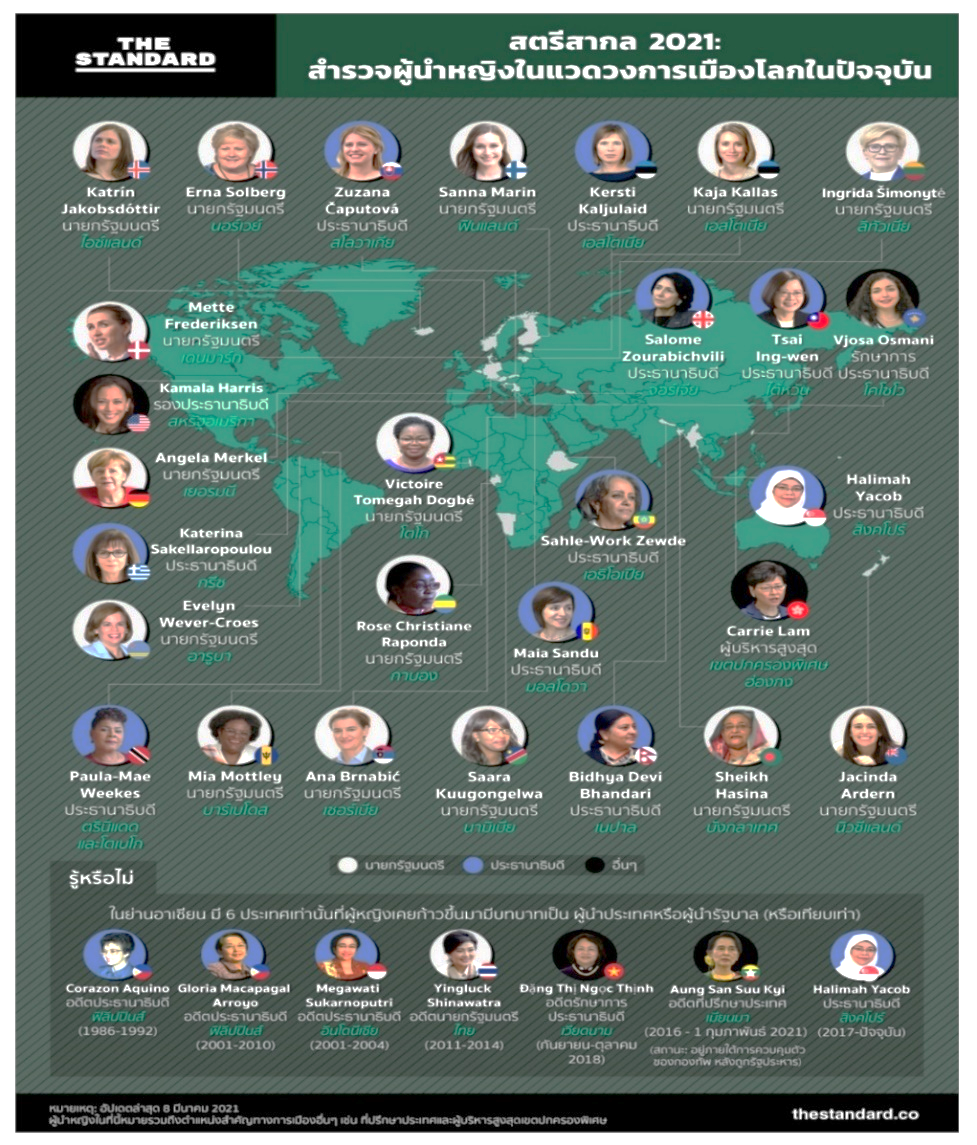ภาวะผู้นำของผู้หญิงแต่ละวัฒนธรรมในศตวรรษที่ 21
Main Article Content
บทคัดย่อ
บทความวิชาการเรื่องนี้ มีวัตถุประสงค์ในการนำเสนอเอกลักษณ์ทางวัฒนธรรมและภาวะผู้นำหญิงจากหลากหลายประเทศทั่วโลก เพื่อนำเสนอประเด็นความสัมพันธ์ระหว่างเพศชายและเพศหญิงในแต่ละวัฒนธรรมที่เกิดความเหลื่อมล้ำและสร้างความไม่เป็นธรรมในสังคม ตลอดจนได้นำเสนอพัฒนาการของความพยายามของรัฐบาลที่พยายามเปลี่ยนแปลงความสัมพันธ์ที่เหลื่อมล้ำให้ไปสู่ทิศทางที่สมดุลยิ่งขึ้น และการเข้ามามีบทบาทของเทคโนโลยีในศตวรรษที่ 21 ก่อให้เกิดความเคลื่อนไหวในการรณรงค์เรื่องสิทธิสตรีในสื่อสังคมออนไลน์มากขึ้น นอกจากนี้ยังนำเสนอประเด็นที่เชิญชวนให้ร่วมช่วยกันคิดว่าแนวคิดสตรีนิยมและขบวนการขับเคลื่อนทางสังคมของผู้หญิงรวมทั้งนโยบายของรัฐบาลควรเปิดโอกาสและสนับสนุนผู้หญิงในทิศทางใดต่อไปในอนาคต เพื่อให้สอดคล้องกับโลกในศตวรรษที่ 21 ที่เป็นยุคดิจิทัลเปลี่ยนโลก (The New Digital Age) และเป็นโลกที่ไร้พรมแดน หรือ ยุคโลกาภิวัตน์
Article Details

อนุญาตภายใต้เงื่อนไข Creative Commons Attribution-NonCommercial-NoDerivatives 4.0 International License.
เนื้อหาและข้อมูลที่ได้รับการเผยแพร่ในวารสารวิพิธพัฒนศิลป์ ถือเป็นข้อคิดเห็นและความรับผิดชอบของผู้แต่งเท่านั้น โดยกองบรรณาธิการวารสารไม่มีส่วนรับผิดชอบต่อเนื้อหาหรือข้อคิดเห็นใด ๆ ที่ปรากฏในบทความ
เอกสารอ้างอิง
เกรียงศักดิ์ เขียวยิ่ง. (2550). การบริหารทรัพยากรมนุษย์. เอ็กซ์เปอร์เน็ท.
ชญารัศมิ์ ทรัพยรัตน์ และ ประพันธ์ ชัยกิจอุราใจ. (2556). พฤติกรรมการเป็นสมาชิกที่ดีขององค์การกับผลลัพธ์ที่เกิดขึ้น. วารสารวิชาการมหาวิทยาลัยฟาร์อีสเทอร์น, 7(1), 7 – 22. https://so01.tci-thaijo.org/index.php/FEU/article/view/24713
ณรงค์กร มโนจันทร์เพ็ญ. (2564, 8 มีนาคม). สตรีสากล 2021: สำรวจผู้นำหญิงในแวดวงการเมืองโลกปัจจุบัน. THE STANDARD STAND UP FOR THE PEOPLE. https://thestandard.co/international-womens-2021-female-leaders-in-global-political/
บุญฑวรรณ วิงวอน และ มนตรี พิริยะกุล. (2553). ตัวแบบเส้นทาง PLS ของบุพปัจจัยและผลลัพธ์ของการรับรู้ในการสนับสนุนจากองค์กรของพนักงานวิสาหกิจขนาดกลางและขนาดย่อม จังหวัดลำปาง. http://www.research.ru.ac.th/images/ArticleMr/1501822764_Article.pdf
ปรรณวัฒน์ ชูวิเชียร. (2562). บทบาทของพรรคประชาธิปัตย์ในการส่งเสริมการมีส่วนร่วมทางการเมืองของนักการเมืองสตรีในรัฐสภา. วารสารการวิจัยการบริหารการพัฒนา, 9(3), 96 – 103. https://so01.tci-thaijo.org/index.php/JDAR/article/view/244019/165387
พระมหาวุฒิชัย วุฑฒิชโย, พระมหาบุญรอด อมรทตุโต, กฤษณะ เชี่ยวเวช และ พระครูเกษมอรรถากร. (2565). สิทธิสตรีกับการปกครองระบอบประชาธิปไตย. วารสารพุทธมัคค์ ศูนย์จริยธรรมศึกษา, 7(1), 282 - 296. https://so01.tci-thaijo.org/index.php/bdm/article/view/256872/170729
สุวิทย์ เมษินทรีย์. (2563). โลกเปลี่ยน คนปรับ หลุดจากกับดัก ขยับสู่ความยั่งยืน. กระทรวงการอุดมศึกษาวิทยาศาสตร์ วิจัยและนวัตกรรม.
เสริมศักดิ์ วิศาลาภรณ์. (2536). ประมวลสาระชุดวิชาทฤษฎีและแนวปฏิบัติในการบริหารการศึกษา หน่วยที่ 5 – 8. สำนักพิมพ์มหาวิทยาลัยสุโขทัยธรรมาธิราช.
Al-Jaradat, M.K.M. (2014). Challenges Facing Women Academic Leadership in Secondary Schools of Irbid Educational Area. International Education Studies, 7(5), 147-106. https://files.eric.ed.gov/fulltext/EJ1069310.pdf
Bass, B.M. (1990). Bass and Stogdill’s Handbook of Leadership: Theory, Research and Managerial Applications, 3rd ed. Free press.
Bem, S. L. (1993). The lenses of gender: Transforming the debate on sexual in equality. Yale University Press.
Bateman, T.S., & Organ, D.W. (1983). Job satisfaction and the good soldier: the relationship between affect and citizenship. Academy of Management Journal, 26(4), 587-595. https://www.jstor.org/stable/255908
Blevins, K. (2018). Bell hooks and Consciousness-Raising: Argument for a Fourth Wave of Feminism. In: Vickery, J. Everbach, T. (eds) Mediating Misogyny. Palgrave Macmillan, Cham.
Chamberlain, P. (2017). The Feminist Fourth Wave: Affective Temporality. Palgrave Macmillan, Springer International Publishing AG. Switzerland.
Chodorow, N. J. (1991). Feminism and psychoanalytic theory. Yale University Press.
Gilligan, C. (1982). In a different voice: Psychological theory and women's development. Harvard University Press.
Google Developers. (2017). Past, Present and Future of AI/ Machine Leaning (Google I/O’17). YouTube. https://www.youtube.com/watch?v=0ueamFGdOpA
Grid Alternatives. (2013, 12 November). Erica Mackie Honored for Energy Leadership. https://goo.gl/VWEqB7
Kaye, D. B. V., Zeng, J., & Wikstrom, P. (2022). TikTok: Creativity and Culture in Short Video. Cambridge, Polity Press.
Khattab, J., & Rosette, A. S. (2017). Workplace barriers faced by women leaders in emerging markets. Women Leadership in Emerging Markets: Featuring 46 Women Leaders.
Lavelle, J. J., Rupp, E. D., & Brockner, J. (2007). Taking a Multifoci Approach to the Study of Justice, Social Exchange, and Citizenship Behavior: The Target Similarity Model. Journal of Management, 33(6), 841 – 866. https://journals.sagepub.com/doi/10.1177/0149206307307635
Lixian, H. (2015). On Fire in Weibo: Feminist Online Activism in China. Economic and Political Weekly, 50(17), 79 – 85.
Miller, D., & Droge, C. (1986). Psychological and Traditional Determinants of Structure. Administrative Science Quarterly, 31(4), 539 – 560.
O’Leary, V. E., & Flanagan, E. H. (2006). Leadership In J. Worell (Ed.). Encyclopedia of women and gender: Sex similarities and differences and the impact of society on gender. Elsevier Science & Technology.
Promnart, P. (2015). Modern Women, Modern Man: The Discursive Construction of Sexual Propriety In Sixth-Reign Siam (1910 – 1925). National University of Singapore.
Women Mthai Team (2557, 16 มีนาคม). ผู้หญิงยุคใหม่กับความก้าวหน้าในอาชีพ โดย เชอริล แซนด์เบิร์ก ซีโอโอ เฟซบุ๊ก. MTHAI. https://women.mthai.com/amazing-women/156791.html
Shim, J. (2018). Mind the Gap! Comparing Gender Politics in Japan and Taiwan. GIGA Focus Asia. GIGA. https://pure.giga-hamburg.de/ws/files/21580585/gf_asien_1805_en.pdf
Tsai, C. T. L., & Zhou, L. (2015). A Cultural Confrontation: Western Impacts on Female College Students’s Leisure Opportunities in Taiwan and China. Social Indicators Research., 120(1), 261 – 276. https://www.jstor.org/stable/24721109
United Nations Development Programme. (2013, 3 June). Women’s Representation in Leadership in Vietnam. https://www.undp.org/vietnam/publications/women%E2%80%99s-representation-leadership-viet-nam
World Economic Forum. (2020). Global Gender Gap Report 2020. World Economic Forum.
https://www3.weforum.org/docs/WEF_GGGR_2020.pdf
Xing, M., & Pang, M. (2018). A Cross - Cultural Examination of Chinese and American Female Leadership in Nonprofit Organizations. China Media Research, 14(1), 30-41. https://www.researchgate.net/publlication/323151258
Yeates, N. (2004). Global Care Chains. International Feminist Journal of Politics, 6(3), 369 – 391.
Yukl, G. A. (1989). Leadership in Organizations. Englewood Cliffs. Prentice – Hall.


